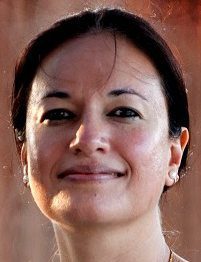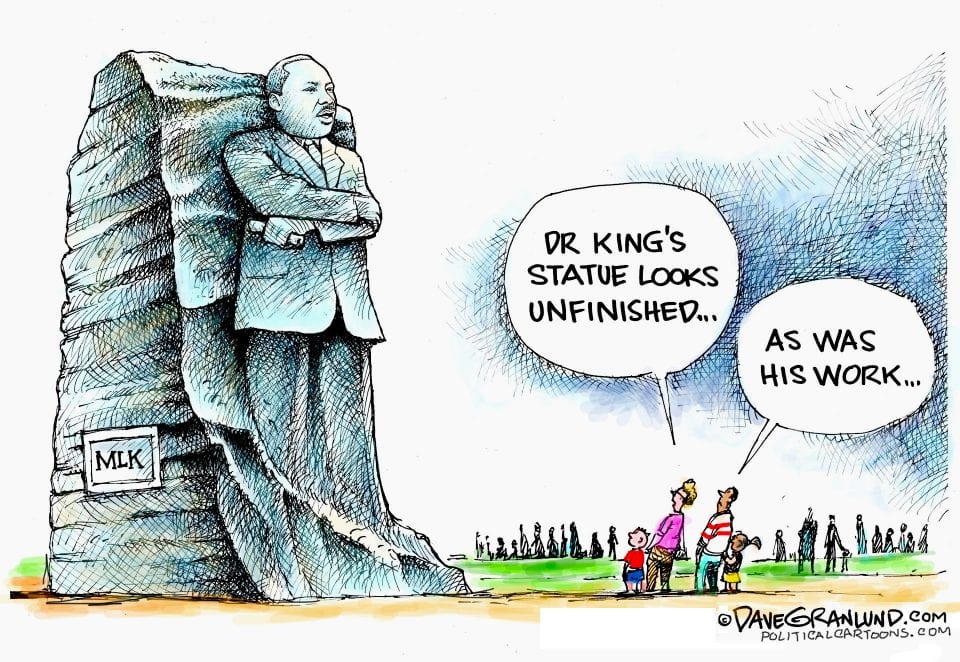BY NYLA ALI KHAN
 Politics should no longer be an abstract notion for young people, but a concrete method to bring about long-term reforms, which younger generations could build on.
Politics should no longer be an abstract notion for young people, but a concrete method to bring about long-term reforms, which younger generations could build on.
Is the politics of Martin Luther King Jr. relevant today? Can the revival of his political ideology compel millennials to recognize the influence that the local community can exercise, and to think constructively about change within organizations and institutions?
The motivation to create empire brought major parts of the earth under the domination of a few powers. These powers used violent, ideological, and cultural practices for disseminating the values that molded the racial and cultural identity of the colonizer as well as the colonized. Western imperialism and colonialism were violent acts of acquisition that were supported by ideological notions of the superiority of the dominant culture and the purported imbecility of non-European cultures. This strategy created an unbridgeable gulf between the “center” and the “margin.”
Martin Luther King Jr. destabilized such dominant assumptions that were the foundation of binary structuration, which is the basis of the pattern of post-Enlightenment conquest and domination in human history. I want to argue that although MLK subverted binaries on which the dominant discourse and practices of American slaveholders and upholders of Jim Crow relied to validate their power, he did not create an inverse valorization of colonized/enslaved over colonizer/Jim Crow upholder. By breaking the shackles of traditional discourse, MLK articulated a submerged voice.
After the event on the politics and legacy of MLK at Temple B’nai Israel, Oklahoma City, yesterday evening, which I attended, I spoke with friends and activists about MLK’s ideology. Here’s what some of them said:
“To me, the life, legacy and words of Martin Luther King, Jr. are about the simple fact that until we truly meet, know and love each other as one community, it will be easy to overlook, neglect, and actively harm the one seen as ‘less than,’ whoever that person or group is at the time. In spite of everything he, his community, and his ancestors endured, he was about speaking the bold truth with a loving hand extended. From jail or the pulpit, he made it clear: if each of us wants a hope and future for our loved ones and ourselves, we must march and work for the ones who have been denied a hope and a future. Our work is done when their dreams of equality and membership in shared humanity are achieved, and not until then.” – Noel Jacobs, Respect Diversity Foundation.
“On this day of reflection on the meaning of Dr. Martin Luther King’s life, I think about King’s use of Gandhi’s non-violent tactics as an anti-toxin to racially-motivated violence in the Deep South. Growing up in Georgia and participating in the Civil Rights Movement, I was profoundly impacted by the conditions of segregation in every aspect of my pre-adolescent life. During my coming of age, I was happy to engage in every opportunity to address these issues and legislative changes in the mid-1960s under the aegis of the Southern Christian Leadership Conference [SCLC]. Through SCLC, Dr. King established a solid coalition including the black middle class, students, and other people of color, as well as white clergy and white liberals in general. When Dr. King was assassinated in Memphis in 1968, during the garbage workers’ strike, many felt that he had transcended racial issues to confront more general economic issues experienced by the global working class. Furthermore, Dr. King had begun to denounce the Vietnam War, thereby placing him more fully in the international sphere with regard to issues of human rights, human dignity, and basic human sustainability.” – Dr. Betty Jean Harris
“Dr. Martin L. King Jr. was an extraordinary American. As a Black/Creole American child growing up in New Orleans, even I understood the power of what he was trying to accomplish. Others in the Civil Rights movement, such as Angela Davis and Malcolm X, were indeed necessary sources of strength and identity during this period of extraordinary hatred. They taught me the power of direct resistance. However, Dr. King taught me the power of love and hope. Dr. King’s approach broke every innate tendency of survival under brutality, but his belief that light and love can overcome hate spoke to me at a spiritual level. It is emotionally easier to retaliate and express anger, but Dr. King’s response required great faith that justice can be achieved through non-violence. He also lived a belief that people can be enlightened and changed. Though he was influenced by many, as a Christian [one who loves others as one loves self and does no harm] I noted his similarity to Yeshua of Nazareth, for he said, ‘Greater love has no one than this: to lay down one’s life for one’s friends.’ [John 15:13]” – Dwain Pellebon, PhD, LCSW Ending Violence Everywhere Coalition
“Martin Luther King Jr. was a complex and flawed man who was able to inspire generations to question their roles in the pursuit of justice and gave his life for that dream.” – Germain Odenheimer, OKC physician
“Martin Luther King Jr. was a dynamic and visionary leader who consistently and urgently progressed systems forward for the African American community. MLK remains a dynamic and visionary leader, whose words continue to speak truth into a world that remains determined to exclude and demean members of humanity. As a person of faith, this treatment of persons will never be acceptable and, like MLK, I will continue to work consistently and urgently to progress systems forward toward full acceptance and love.” – Shannon Fleck, executive director, Oklahoma Conference of Churches
“I spent my first eight years in the deep south, prior to integration. If I had stayed there for the rest of my formative years, I might now be a very different person, with different values and worldview. But my father’s work took my family to a small Eskimo village in Alaska, and then to the island of Puerto Rico, so I lived as a minority in two very different cultures until I was 14. When I returned to the mainland U.S., I discovered that those experiences had given me something priceless: tolerance for difference, empathy for minorities, and, most important, recognition that my middle class white culture was not the global, or even national, norm.
“That’s what Dr. Martin Luther King Jr. represents to me: the challenge to disengage from one’s own particular experience – and self-regard – and to give others that same right and regard. As a member of a majority class, to seek to reject dominance, and rather to be open and respectful to all, and certainly to demand that our political and judicial systems provide equal opportunity and justice. Unfortunately, Dr. King’s efforts to this end must still be continued to this day, since we have not yet reached the ‘mountaintop’ where all are judged by their character, not the color of their skin.
“I also am an opponent of war, and to me it is disturbing and dangerous for us to not include Dr. King’s radical nonviolence as part of his remembrance. It saddens me to see this important message left out of so many celebrations of his life. It was the very foundation of all he did for civil rights, justice and dignity. Anyone who wants to embrace him, or echo his name in their work, must also abhor militarism, imperialism and war.” – Rena Guay, director, Just Future
I observe that MLK’s sense of community enabled him to employ individual assertion as well as cultural resilience as acts of resistance to the dehumanizing aspects of slavery, racism, and bigotry, through which he achieved self-definition in an imperial world order. His strategic employment of the collective resilience of the “black” voice was an attempt to buttress his negotiation with entrenched ideological structures. He did not nurture nostalgia for an Edenic Africa but, on the contrary, sought to forge a space for equality and justice within the available infrastructure. He shook the morally fabric of “white” society by attributing “unchristian” and “uncivilized” behaviors to the representatives of the regime prior to and during the Civil Rights era.
We could do with the resurgence of such politically and morally discerning as well as self-constructed individuals in the current era of violent polarization – an era in which human rights and values have been rendered defunct.
“I am not interested in power for power’s sake, but I’m interested in power that is moral, that is right and that is good.”– Dr. Martin Luther King Jr.
– Nyla Ali Khan is the author of Fiction of Nationality in an Era of Transnationalism, Islam, Women, and Violence in Kashmir, The Life of a Kashmiri Woman,and the editor of The Parchment of Kashmir. Nyla Ali Khan has also served as a guest editor working on articles from the Jammu and Kashmir region for Oxford University Press [New York], helping to identify, commission, and review articles. She can be reached at nylakhan@aol.com.








